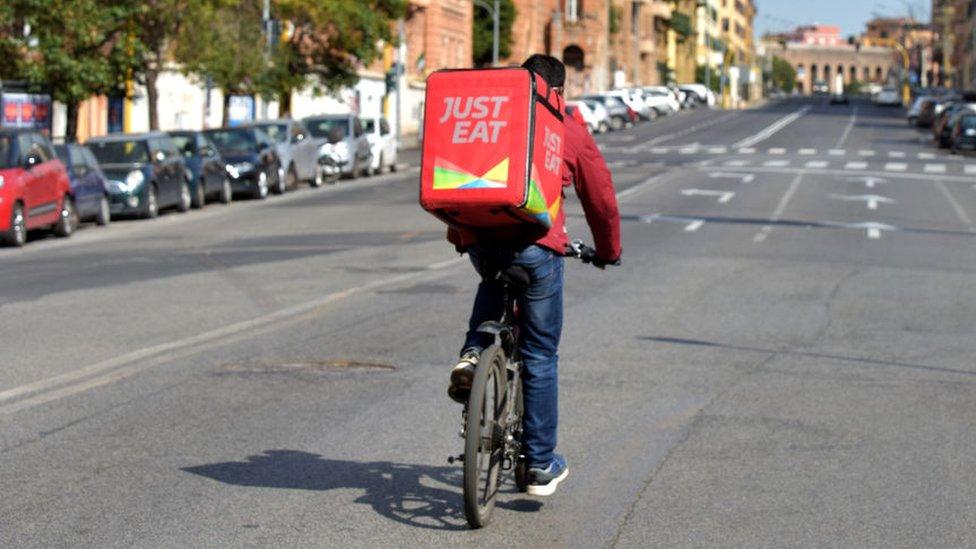Coronavirus: 'I lost my job and launched a pop-up food business'
- Published
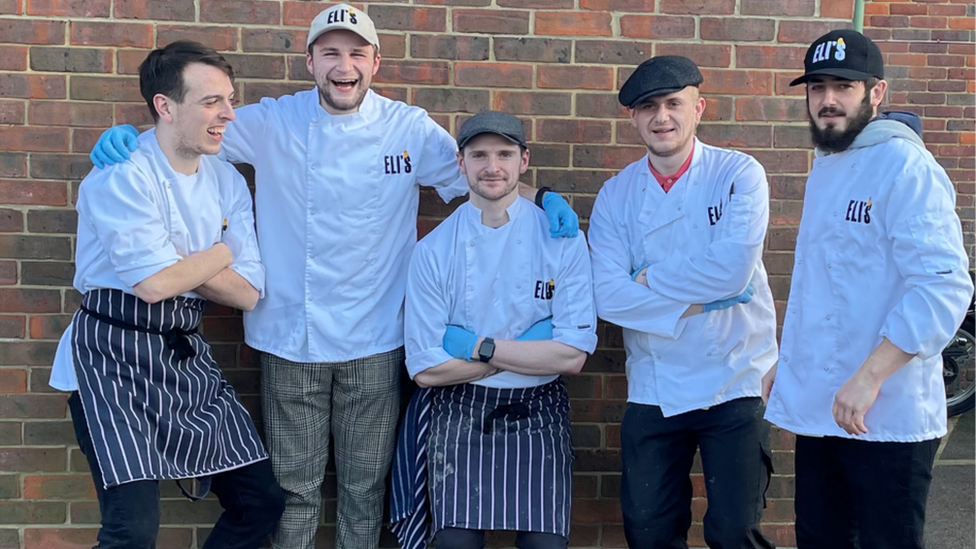
Friends (L-R) Andrew Dempsey, Sean Egan, James Godfrey, Charley Crane, and Danny Wheeler decided to set up their own street food business
Danny Wheeler was raised on a council estate in Hatfield and it was always his dream to have his own fried chicken business.
So when he was made redundant from his digital marketing job during the pandemic, he teamed up with friends to open their own firm, Eli's Pop Up, external.
"It's very empowering," he says. "I don't regret anything."
After building up a social media buzz, they started taking orders through a website and using a kitchen in a local pub to prepare food to deliver around Hatfield.
There were some teething problems - "Our first night was an absolute catastrophe," he says - but now the business is running smoothly.
"It is a sacrifice in terms of time," he says. "You need the passion and the energy.
"I did the website, a friend designed the logo, we make the food - everything is made from scratch."
Danny and his friends used to travel down to London to buy street food such as fried chicken and burgers, being unimpressed with the selection in Hatfield from fast-food chains, and also by their ethos.
With the big chains, "there's no connection between the business and the community," he says.
Firms like Eli's Pop Up have been riding a huge rise in people ordering online takeaway and restaurant deliveries during the Covid-19 crisis.
Successive lockdowns have meant many restaurants signing up to food delivery platforms to reach customers unable to get out and dine in.
But some independent businesses decided to go it alone and set up their own delivery network.
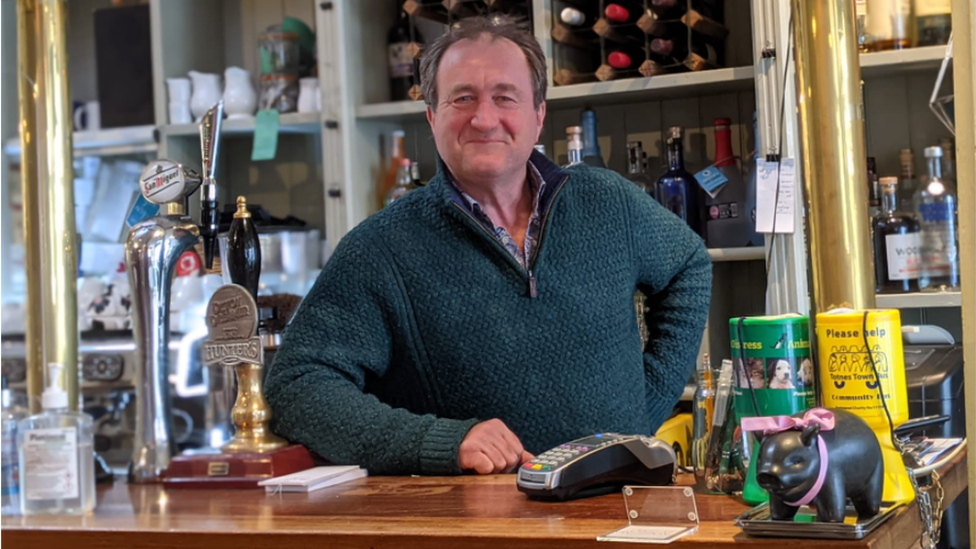
Bill Eaton says people in Totnes appreciated that the business kept going during the pandemic
Bill Eaton runs Pie Street in Totnes with his business partner, Richard Hobson-Scott.
During the first lockdown, they were faced with a choice - mothball the business and keep furloughing the staff, or ramp up their small delivery operation.
They chose the latter and bought a moped to bike pies around the small Devon town.
While the business would be in the same position financially had they closed down, Pie Street has raised its profile and built up a lot of goodwill by delivering, Bill says.
"In the long run, it will be a benefit, because we are one of the businesses that kept going and didn't give up," he says. "It's been great fun."
He adds pies are the perfect comfort food in a pandemic. "When people need cheering up, when you think of a pie you can't help but smile," he says.
And with Covid restrictions due to end in June, the business is expecting the "busiest summer ever".
"We're looking forward to it and dreading it," he says.
Online boom
Hospitality has been battered by the coronavirus crisis and was one of the sectors worst hit by the pandemic.
The crisis cost the sector £200m per day in 2020, with sales dropping more than half, industry body UK Hospitality said in January, external.
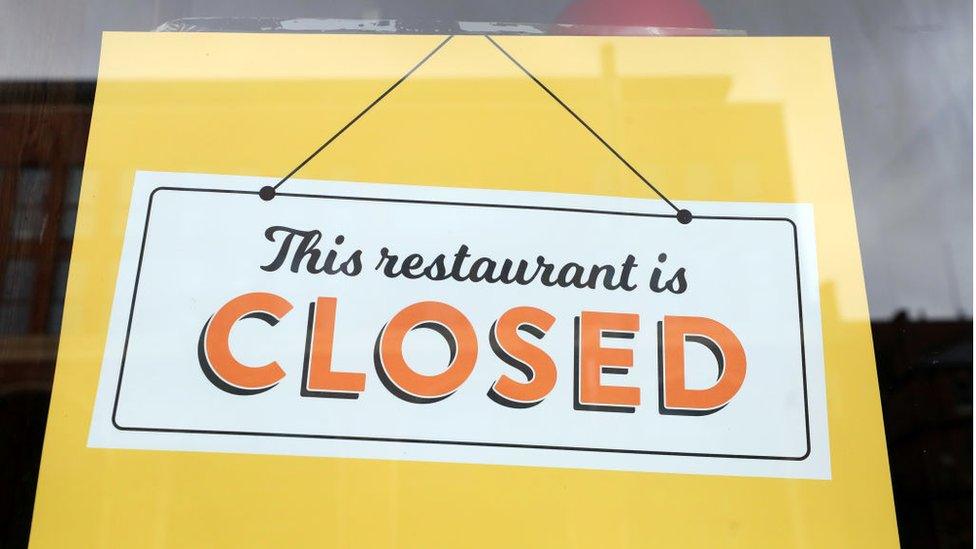
But struggling restaurants and takeaways got a boost from online deliveries, according to analyst firm Kantar.
While the food and soft drinks market nearly halved to £26bn from March to January compared with the previous 10 months, the value of deliveries more than doubled, jumping to nearly £6bn.
"People were looking for ways to treat themselves," said Kantar analyst Lucy Chapman. "People were looking for ways to vary their routine."
Rather than cooking at home all the time and washing up or loading up the dishwasher, people wanted to have a break, she said.
Fast food thirst
Those treats mainly took the form of fast food. The value of "quick service" deliveries from March to January more than doubled to over £5bn, a growth of 173%, compared with the 10 months before.
There was much bigger growth for deliveries from restaurants with table service - that value jumped nearly 250% as struggling restaurants looked around for ways to generate cash.
But the value of the fast food delivered to UK customers far outweighed the £580m for table-service restaurants.
Growing appetite
Deliveries rose to all age groups, but the over-55s saw the greatest growth - up 300% to £1.6bn from March to January.
Many people in that age group may not have had restaurant food delivered before, Ms Chapman said, and have now got into the habit.
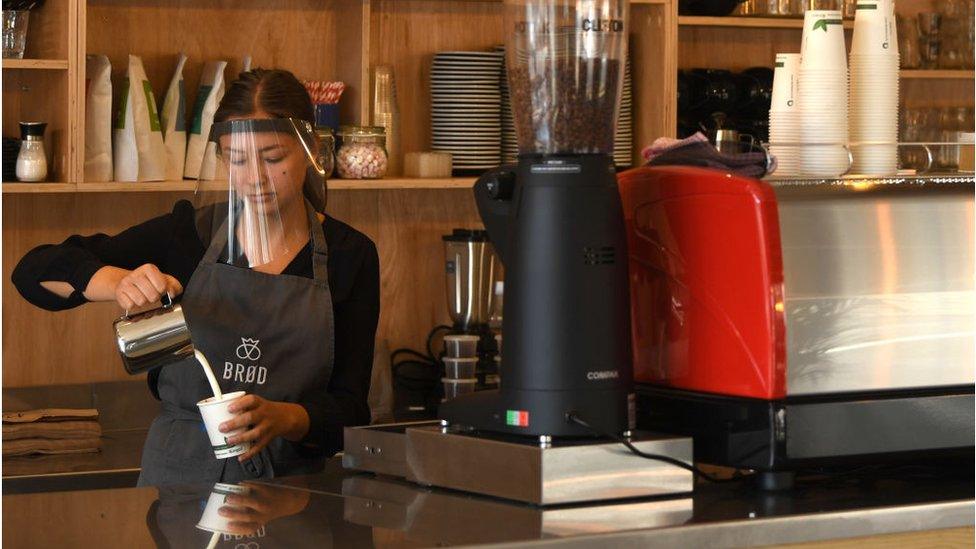
While younger people have been hit hard in the pocket by the coronavirus crisis, that group still spent more than £812m on food deliveries, a 150% increase compared with the time immediately before coronavirus.
Younger people tend to be more comfortable using technology to order food, she said, but with few other options for getting restaurant food in the crisis, older age groups found that it was relatively easy to order online.
There was growth in deliveries across all British regions. Northern England spent the most on food deliveries, with spend nearly doubling to £1.5bn.
TV dinners
As restaurants, pubs and cafes were closed to sit-in customers during the first lockdown, some of the big fast food players such as McDonald's and Nando's also closed their doors.
This left a gap in the market, and as online grocery delivery queues lengthened, many consumers turned to takeaways, said Gaetana Mak, an analyst at research firm Ibisworld.
Even as restaurants reopened in the summer, social-distancing measures meant that many people kept ordering home deliveries, she said.
There was also a rise in people watching on-demand television, which increased food orders.
Streaming services such as Netflix, Amazon Prime Video, and BBC iPlayer, which were already popular, got more viewers during the year.
People ordered food and watched TV as a treat.
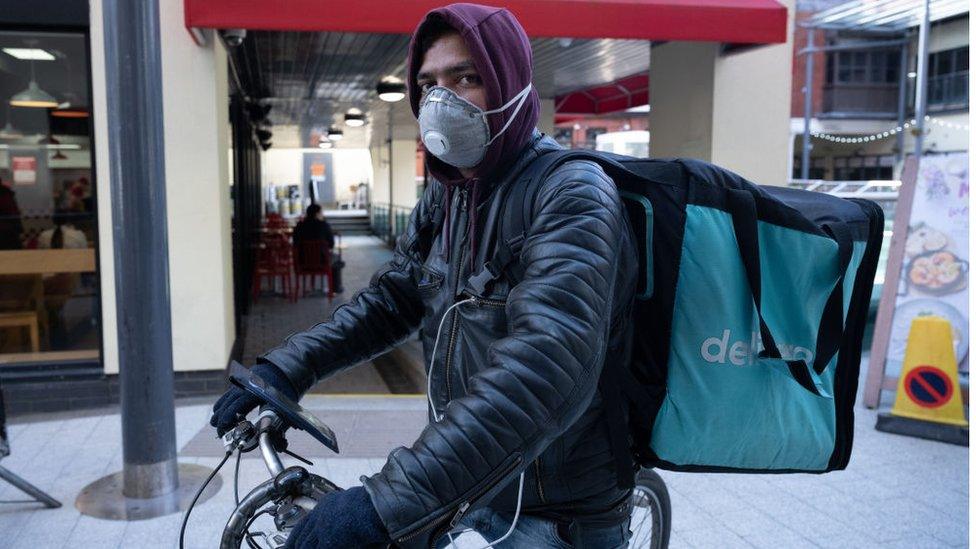
Market slice
Some fast food firms such as Domino's Pizza did well in 2020, with sales and profits growing.
Delivery firms Deliveroo, Just Eat Takeaway and Uber Eats also saw huge growth, although all were still loss-making.
Despite many more deliveries over the past five years, the big food delivery platforms are in a desperate scramble to get more customers, Ms Mak said, with competition cutting into revenues and profits.
However, Ibisworld expects their revenue to increase to £7bn over the next five years.
Deliveries will probably grow over time, the analysts said.
"We expect to see that people have changed a lot, including how we act on a day-to-day basis," said Ms Chapman. "We expect some of those habits will stick. We are not going to go back to how it was."
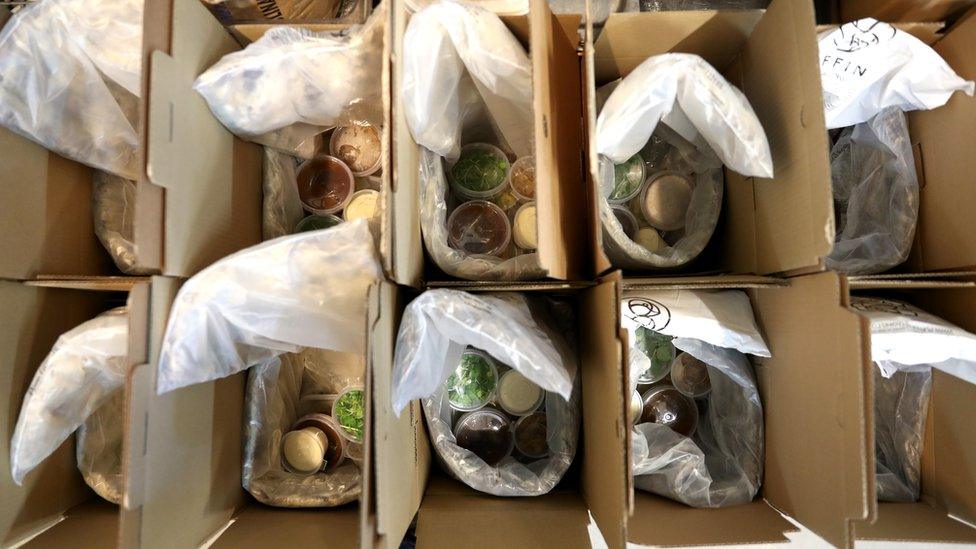
Tom Johnson at management consultants Trajectory Partnership said that the firm expected demand for online takeaway and home delivery to "stay pretty strong".
"This is probably more to do with economic pressures on consumers - takeaway is cheaper than a night out - and people actually quite liking the slower pace of life, rather than concern about going back to restaurants," he said.
UK Hospitality chief executive Kate Nicholls said people were "desperate" to get back into pubs.
But with social distancing "massively" reducing revenues, "even more operators will have to focus on offering both in-venue and takeaway and delivery for some time to come just in order to survive," she said.
- Published12 November 2020
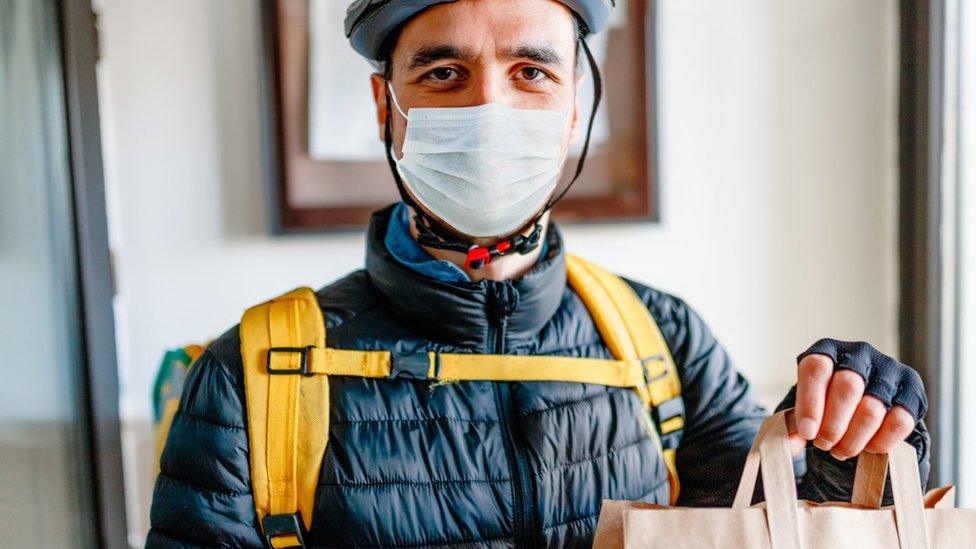
- Published5 November 2020
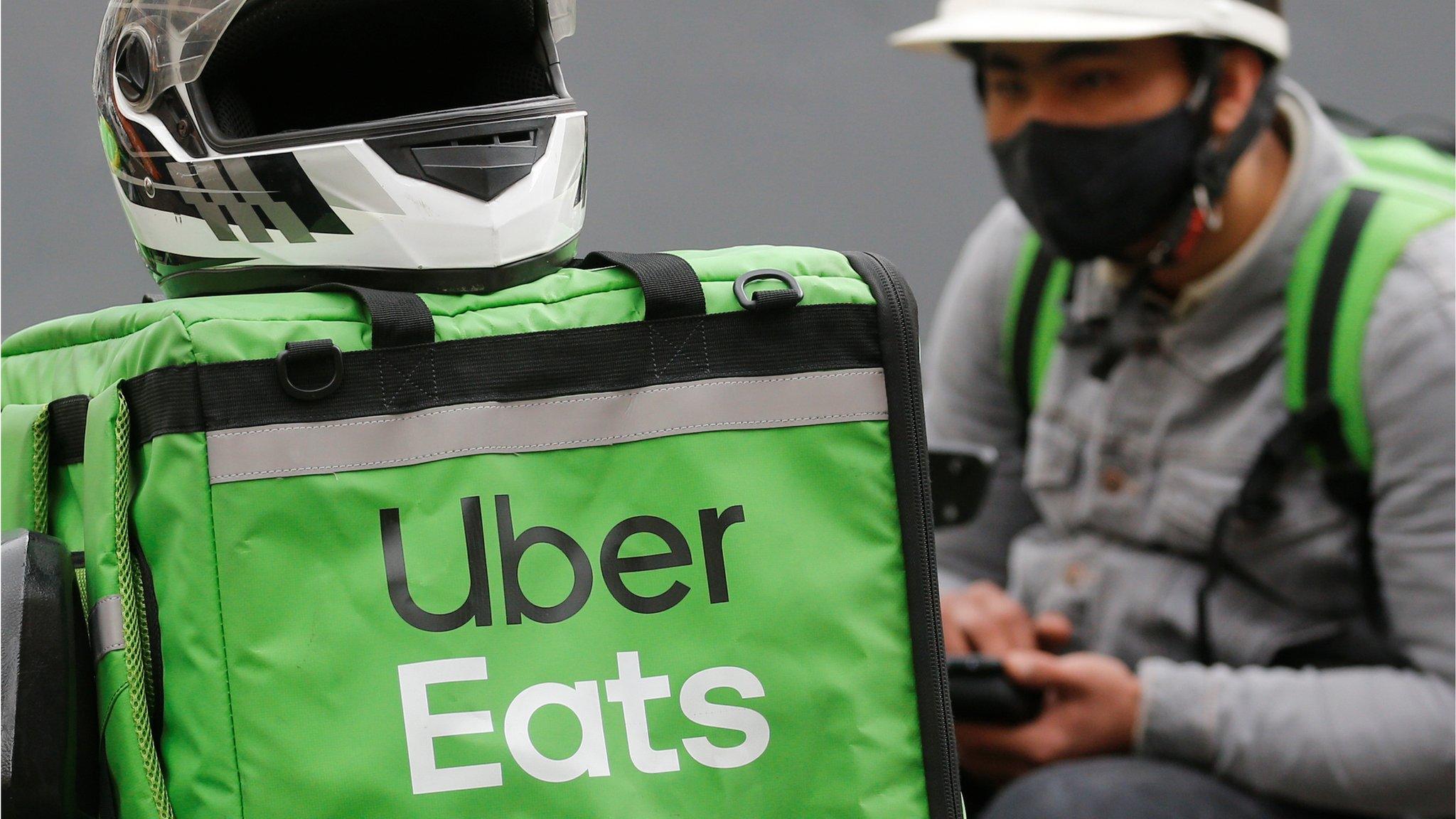
- Published14 October 2020
